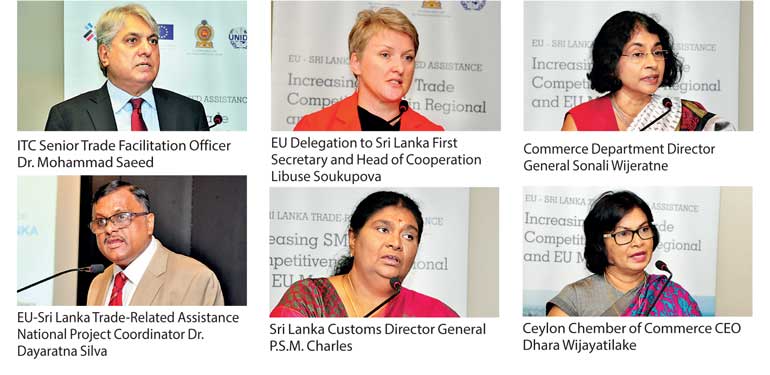Thursday Feb 19, 2026
Thursday Feb 19, 2026
Friday, 6 April 2018 00:00 - - {{hitsCtrl.values.hits}}


By Charumini de Silva
The International Trade Centre (ITC), in collaboration with Sri Lanka’s National Trade Facilitation Committee (NTFC), yesterday held the first of its four public-private consultations on the establishment of a National Single Window (NSW).
The objective of these public-private consultations was to stimulate discussions and seek recommendations from border regulatory representatives and the business community on the implementation modalities of the NSW.
EU Delegation to Sri Lanka and the Maldives Head of Cooperation Libuse Soukupova said the implementation of an effective NSW would no doubt help the country to bolster trade facilitation.
“The implementation of the NSW will assist traders to enhance accountability and transparency, while it will also reduce time and costs currently spent in preparing and submitting information and documents to multiple border regulatory agencies,” he added.
The objective of the NSW is to set up a facility which allows parties involved in trade and transport to lodge information and documents with a single entry point to fulfil all import, export and transit-related regulatory requirements.
NTFC Chairperson and Sri Lanka Customs Director General P.S.M. Charles said eight committees formed by Prime Minister Ranil Wickremasinghe were currently working on the blueprint for the NSW.
It was pointed out that the recommendations from yesterday’s consultation would be shared with the NTFC as well as the World Bank Group which was currently involved in the development of a Single Window Blueprint that would formulate recommendations for the consideration of the Government as the country proceeds towards implementation.
Being a key organisation that collects revenue for the Government, she said Sri Lanka Customs has taken some proactive initiative such as online payment, 24x7 service and has also stepped into e-signatures.
“Now we are working on our paperless documents. We have submitted the draft to the ministry to pass amendments to pre-arrival documentation. It is all coming under trade facilitation,” Charles added.
In addition, she pointed out that they were looking forward to developing a risk management directorate separately focusing on three areas which includes management directorate, auditing and improving the central intelligent unit (CIT).
“We are also looking at automated custom activities. With the support of all stakeholders we are trying to improve the level of compliance of traders. These will happen soon with the assistance of the EU and World Bank,” she stated.
Charles highlighted the importance of assisting SMEs in trade facilitation, noting that they contribute to about 60% of the GDP.
NTFC Co-Chairperson and Department of Commerce Director General Sonali Wijeratne said the objective of the discussion paper had a unique combination of the different functions described, reached on the basis of national priorities and the availability of finance expertise.
“I think this discussion paper is looking at what is most appropriate for each country. One has to see what the ground realities are and what is most appropriate for the country. The choices made by other countries are based upon their national needs. We must do what is best for Sri Lanka. This approach is very commendable,” she added.
Ceylon Chamber of Commerce Secretary General Dhara Wijayatilake pointed out now that the political leadership was sorting out its own battle in a separate arena and it was time for the public sector to play its role and be accountable, efficient and produce meaningful results.
She noted that the benefits that are perceived for trade and beyond would contribute to achieve higher objectives of the economic development which will trickle down to all citizens.
Wijayatilake stressed that it was critical to have initial stage stakeholder consultation before decisions are made and often reversed, hampering the growth of the private sector.
Organised within the mandate of the EU-Sri Lanka Trade Related Assistance program, over 70 participants representing more than 50 business associations, government agencies and trade operators attended the event.
As one of the fastest growing economies in the Asia-Pacific region, Sri Lanka has risen steadily to become a regional trade and logistics hub and is striving to make its economy more interconnected with regional and global markets.
In line with its vision to become South Asia’s logistics hub, Sri Lanka has ratified the WTO Trade Facilitation Agreement (TFA) and is legally committed to implement a series of reforms aimed at the simplification and modernisation of cross-border formalities.
The implementation of a single window is one of the obligations under the TFA. It is also an important milestone in improving Sri Lanka’s business competitiveness in international markets.
The Government of Sri Lanka has committed to create a NSW as a national priority with support from the highest levels in the government and private sectors. Local stakeholders are expected to define the Single Window functionalities that would best contribute to improve Sri Lanka’s trading environment.
Pix by Lasantha Kumara